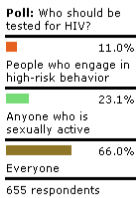Poll: Who should be tested for HIV? [July 2008]
The Centers for Disease Control and Prevention (CDC) now recommend routine HIV screening of all adults and adolescents, including pregnant women.

Poll ended July 2008. |
People who fall into the following categories may be at greater risk for infection and should be certain to get tested for HIV: injecting drug users; those who have engaged in unprotected vaginal, anal, or oral sex with men who have sex with men (MSM), multiple partners, or anonymous partners; anyone who has exchanged sex for drugs or money; those diagnosed with or treated for hepatitis, tuberculosis (TB), or a sexually transmitted infection (STI); and anyone who has had unprotected sex with someone who fits any of the above criteria.
An estimated 16 to 22 million Americans annually get tested for HIV. However, one in four HIV-positive Americans remains unaware of his or her status.
According to a 2006 National Health Interview Survey, non-Hispanic blacks (51.6 percent of men and 53.5 percent of women) were more likely to report getting tested for HIV than Hispanics (35.7 percent of men and 46.1 percent of women) or non-Hispanic whites (30.5 percent of men and 33.5 percent of women). Overall, women (37.8 percent) were more likely than men (33.7 percent) to report getting tested for HIV.
Reasons for Testing
Knowing your status can allow you to begin treatment, if necessary, help prevent the further spread of the virus, and in some cases prevent complications associated with HIV infection. Those who are tested typically receive information about how to avoid passing the infection to partners and how to protect themselves from other STIs, such as syphilis, gonorrhea, and herpes. Testing sites also often disseminate educational materials to people who test negative on how to stay negative. Unfortunately, many people do not get tested for HIV until they are already sick. Don’t delay! If there’s even a slim chance that you were exposed to HIV, get tested today.
Testing Options
Several types of HIV antibody tests are in use today, including standard blood test, oral mucosal test, and the rapid HIV antibody test. Standard HIV antibody tests usually require up to two weeks for results, while rapid HIV antibody tests give results in 20 minutes. Rapid tests allow people to learn their status quickly in both clinical settings and in the privacy of their own home.
After exposure to HIV, it can take some time for the immune system to produce enough antibodies to be detected by an HIV test. Usually people develop antibodies in the first three months following infection. Repeat testing should be considered three months after the exposure occurred in case of an initial false-negative result.
Get Tested!
Remember, testing is prevention! June 27 is National HIV Testing Day. To learn more about HIV testing, click here.
Sources
Centers for Disease Control and Prevention. HIV Testing. January 10, 2007. Available at: http://www.cdc.gov/hiv/topics/testing/index.htm.
QuickStats: percentage of adults aged > 18 years who reported ever being tested for human immunodeficiency virus (HIV), by sex and race/ethnicity. National Health Interview Survey, 2006. MMWR 2007; 56(31): 796. Available at: http://www.cdc.gov/mmwr/preview/mmwrhtml/mm5631a5.htm